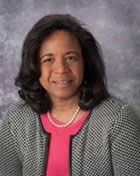Interview with ASH Ambassador Laura De Castro, MD
Dr. Laura De Castro participates in the ASH Ambassador program, serving as a bridge between the Society, mentors, and trainees.

Dr. De Castro is an Associate Professor of Medicine at the University of Pittsburgh Medical Center’s Division of Hematology and Oncology. She is the Director of Benign Hematology for the Institute for Transfusion Medicine and UPMC Hillman Cancer Center and the Director of Clinical Translational Research for the Sickle Cell Disease Research Center of Excellence in Pittsburgh.
Tell us a little bit about your background.
When somebody asks me about my background, I usually answer that I’m a “citizen of the world,” given my family’s origins and current status. What do I mean by that? My mother was an oncology nurse, born and raised in Costa Rica from Jamaican parents, who met my born-and-raised Dominican father in New York City while he was “just” an intern and she was the head nurse. She ended up marrying him and moving to the Dominican Republic (DR) with two little children and never looked back. My father became the first foreign trained hematologist in the DR. When he passed away, he was an ASH Emeritus member; thus, I have been indirectly participating at ASH and the International Society of Hematology meetings since I was a child, since my father’s meeting attendance often was also our annual family trip. The highlight of my 1st year in medical school was having the honor to meet Dr. Maxwell Wintrobe at the joint meeting of the International Society of Hematology and the International Society of Blood Transfusion in Montreal, Canada.
My “citizen of the world” status is strengthened by having a Venezuelan husband, children studying in France and Canada, a set of nieces and nephews that speak Dutch, Mandarin, Spanish, and English, and another set that speaks French, Spanish, and English. These just strengthen my professional and academic need to think globally instead of locally.
What made you want to study medicine and what brought you to the field of hematology?
As long as I can remember, I wanted to study medicine, except for a time in high school when I wanted to be a special needs teacher, and my hypothetical dream of been a classical ballerina. ... I guess choosing hematology was a call based in what I grew up seeing, but also it was highly influenced by my life-long desire to work with underserved populations, my interest in internal medicine, and my identification with the depth and ways that hematology, specifically benign hematology, interconnects with other internal medicine specialties, as well as with surgery and pediatrics.
What influenced your pathway to leadership?
A pathway to leadership allowed me to stand in powerful shoulders: my father; Ellen Koenig, a virologist who sparked my interest in research; Lennette Benjamin; Joel Rappaport; Bernie Forget; Nancy Berliner; Marilyn Telen; Mark Gladwin; and others; but most importantly, those with chronic/complex diseases with high psychosocial impact who require caretakers like me to collaborate with a multiplicity of experts while trying to think “outside the box,” in order to improve their quality of life as we search for the cure.
Tell us about your work in promoting diversity in hematology and why it is important to you and to the field.
Recently, while preparing a talk about diversity, I was looking for a word starting with C to add to the main theme, “Catalyze, Connect, and Celebrate,” and I asked my daughter for help. Her answer really resonated with me: “Another world starting with C is NOT an example of diversity.” … I believe that diversity comes in different “shapes and flavors” and that hematology as a science and a specialty defines diversity very well. Thus, it is just natural that in this current age of scientific globalization, I seek to engage and attract the next generation of hematology in ways that reflect both the patients that we care for and serve as well as the discipline that we embrace and practice. ASH and the Ambassador program have served me, on a silver plate, the opportunity to add to that personal and collective interest by enhancing the efforts to attract rising physicians and scientists to pursue hematology as a career, while sparking in them my passion for the physical and psychosocial health of individuals living with Sickle Cell Disease.
View the profiles of two other outstanding ASH Ambassadors, Dr. Oluwatoyosi Onwuemene and Dr. Rahma Warsame.